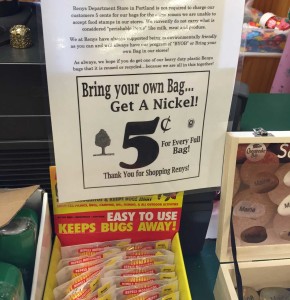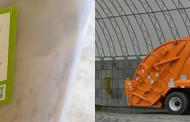by Tony Zeli
Earlier this year Portland became Maine’s first city to place a five-cent fee on disposable, or single-use, shopping bags. While some businesses fought the fee, others have embraced it.
The bag fee is a mandatory fee of five cents for every disposable bag, paper or plastic, a consumer uses. Businesses charge and retain the fee. The goal of fee is to reduce plastic and other debris that clogs storm drains, harms wildlife, and litters waterways and roadsides.
Portland’s Greener Cleaner, offering wet cleaning which is a water-based alternative to traditional chemical dry cleaning, is one business that is using the new ordinance to its advantage.
The 5 cent fee only applies to stores that sell groceries, so many other types of businesses, such as dry cleaners, are exempt from the requirement. Yet, Portland’s Greener Cleaner has decided to voluntarily comply with the City’s new bag ordinance to reduce waste and promote their business.
Money generated from the bag fee will be donated to Friends of Casco Bay, the environmental organization working to improve and protect the environmental health of Casco Bay.
“One goal of our business is to clean garments in a way that has the lowest impact on the environment and human health, so working to reduce the use of plastic bags in our process is a natural extension of what we do,” said Jason Wentworth, co-owner of Portland’s Greener Cleaner.
When customers come to the counter for the first time to leave off garments for cleaning they are given several options: new plastic bags at 5 cents each, no plastic cover, or a re-useable cloth garment bag for a $7.00 deposit. If they choose new plastic they are also offered the option to bring back the bags for reuse as long as they are in good condition.
“What we are discovering is that once we have the discussion with customers about how their garments are packaged, most people express appreciation for being offered an alternative to plastic and admit that they really don’t like the plastic because it just creates more trash at home,” says Jason Wentworth.
“Nearly all of our customers are choosing no plastic cover or a re-useable cloth garment bag,” adds Sandrine Chabert, who is co-owner of Portland’s Greener Cleaner and the wife of Jason Wentworth.
Other businesses have been on the bag conservation bandwagon for some time now. Renys and Whole Foods have long-established programs to conserve bags. Both are doing the opposite of the City, and instead of charging 5 cents per bag they are rewarding customers who use their own bags by returning 5 cents to them. Bring in your own bag and get a nickel.
Renys implemented their Nickel Back Program about 10 years ago, and they plan to continue the program for the foreseeable future at all of their 16 locations throughout the state.
“[Customers] like it. It surprises them,” says Carlton Hodge, General Manager at the Portland Renys.
Reny’s President John Reny estimates the retailer gave out between 4000 – 5000 nickels statewide last year alone.
The program is likely a moneymaker for Renys because their sturdy self-designed bag costs more than 5 cents per bag to produce. But the number one reason for Renys’ Nickel Back Program is conservation.
“I designed our bag 25 years ago to make it heavier and reusable” says John Reny. He takes pride when he sees Mainers reusing the thick plastic Renys’ bags for their day-to-day needs.
Says Portland’s Greener Cleaner Jason Wentworth, “I think times have changed, people are becoming more aware of unnecessary waste and the fee is just a little reminder to think about whether we really need that bag.”
John Reny would agree that consumers are more than ready to conserve and use their own bags. He recounts sitting in a Hannaford parking lot to enjoy a quiet moment and a little lunch watching folks come and go from the store, “You’d be amazed at the amount of people who bring reusable bags.”
Other Maine communities where environmental groups are pushing for disposable bag ordinances include York, Falmouth, Freeport, Brunswick, Topsham, and South Portland.
Of course, if businesses want, they can always jump out ahead of the government and start their own bag programs. They just might find that it is exactly what their customers want.






